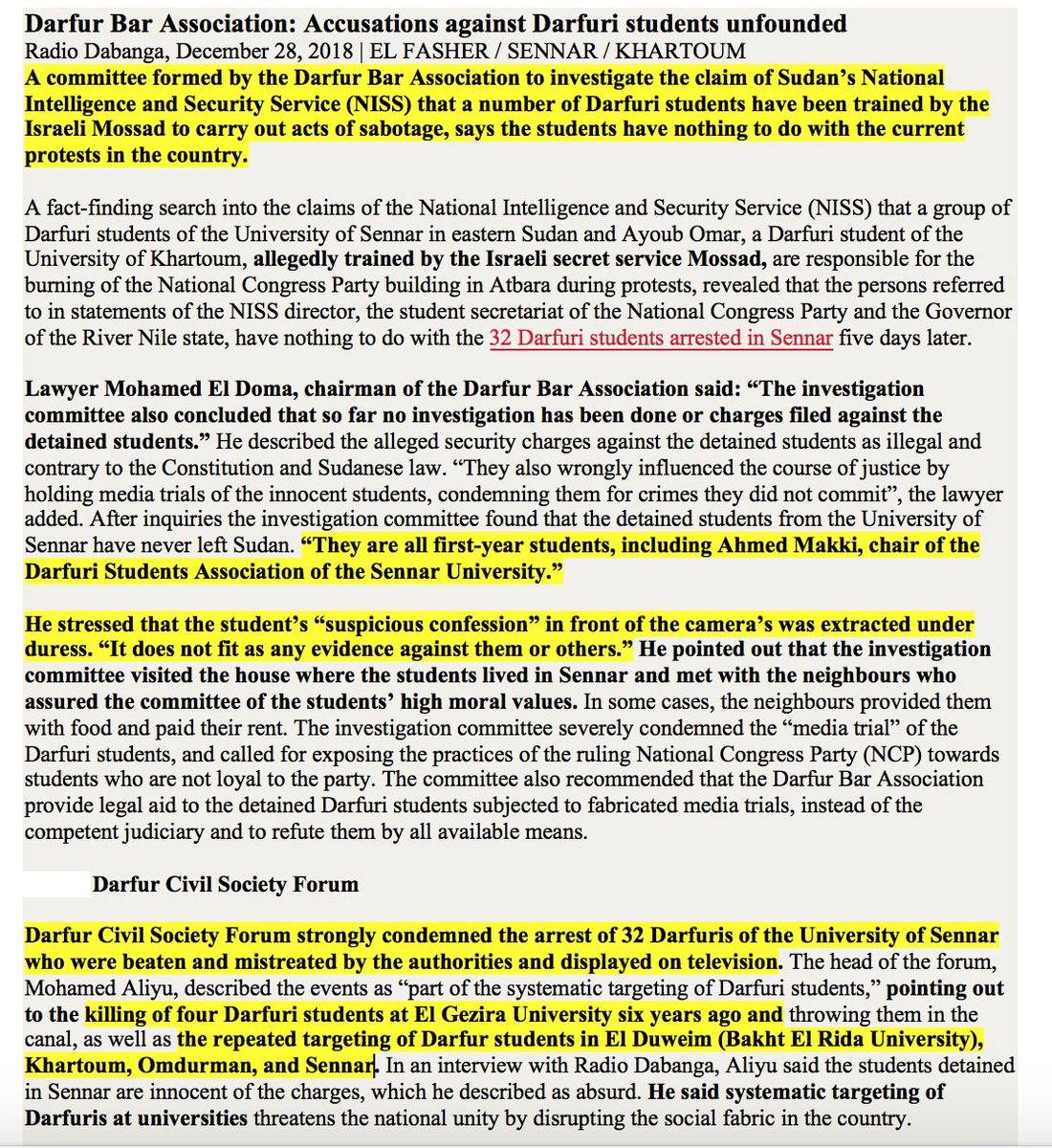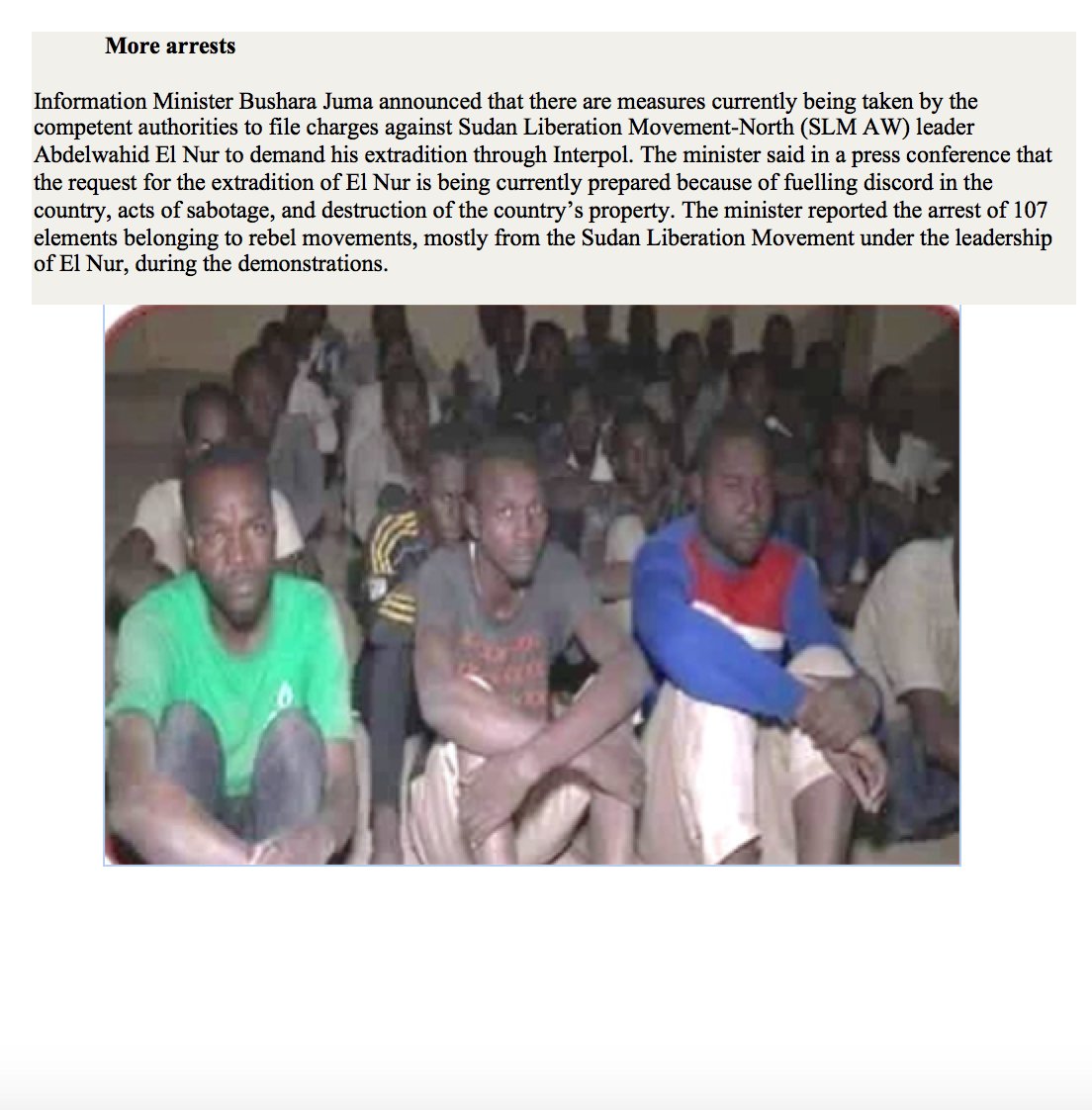Sudan Is Exploding in Protests: Continuing Updates, January 1, 2019
Eric Reeves | January 1, 2019 | https://bit.ly/2scaZet
December 29, 2018 | https://wp.me/s45rOG-misc
December 27, 2018 update | https://wp.me/p45rOG-2kW
December 26, 2018 update | https://wp.me/p45rOG-2kH
First posted December 20, 2018, 10:45 | https://wp.me/p45rOG-2kh
Despite the Khartoum regime’s efforts to stifle all reporting on protests, demonstrations, and the number of people killed, wounded, and arrested, a good deal of news has been authoritatively reported, especially by Al Jazeera, CNN International, and the BBC. Human Rights Watch and Amnesty international have also spoken out forcefully about what has been reported to them by sources inside Sudan. There has also been some poor reporting, often rife with consequential errors and lack of research (the New York Times article on Sudan’s participation in the war in Yemen is a signal example).
To date the international response has been extremely weak and certainly not of a sort to change regime behavior. Indeed, there is a good deal of expediency and disingenuousness on the part of the UN Secretary General, the African Union, and various Western countries, noted in the various postings included in this compendium of events over the past three days. Demands that the regime of Omar al-Bashir—himself indicted by the International Criminal Court for genocide and crimes against humanity—investigate its own war crimes are preposterous exercises in unctuous non-speak.
Events as I have seen them since December 29, 2018:
January 1, 2019:
• The motto of al-Bashir regime in confronting democratic demands in Sudan, protests, and civil society unrest is quite clear: “Control the news in all ways necessary; arrest independent journalists; and shut down individual voices by silencing the Internet, social media, telephone service:
Sudanese newspaper banned, journalists threatened | Radio Dabanga, December 31, 2018 | KHARTOUM
Officers of the Sudanese security apparatus have continued confiscating newspapers in Khartoum, most recently banning El Jareeda daily from printing on Sunday. The newspaper was banned on the same day that the Sudanese Journalists Network expressed concern over reports of abuse of journalists by members of the National Intelligence and Security Service (NISS). Additionally, the network is concerned about threats received by some journalists who wrote critical pieces about the killing of demonstrators.
Also, in the statement, the suspension of journalist Yousef El Jalal from the S24 satellite station on the grounds of his appearance in one of the channels as an analyst, was condemned. The network further called on all Sudanese journalists in Khartoum to participate in the march organised by the Sudanese Professionals Association yesterday. This echoed calls made by the network last week for journalists to go on a three-day strike.
Nine journalists were briefly arrested last week by the NISS while gathered outside the headquarters of the newspaper El Tayar in protest against harassment of the media. Around ten reporters were also briefly arrested by the NISS on 25 December. On that same day, three journalists were physically attacked by members of the security forces. Two – Al Jazeera correspondent Ahmed Alrehaid and El Tayar editor Khalid Fathi – were injured while covering protests. The third, El Sudani editor Yassir Abdallah, received several blows to the face as he was forcibly taken away in car after a NISS raid on the newspaper. Reporters Without Borders (RSF) reported the security forces also tried to storm the offices of two other newspapers, El Tayar and El Mustaqila.
On December 20, the NISS summoned several journalists in Khartoum for covering topics related to the ongoing economic crisis, and related cash, fuel, and bread shortages. The Sudanese Journalists’ Network has condemned the summonses as a violation of the media charter. The media in Sudan are continuously subjected to confiscations of newspapers, and summons and detentions of journalists. Sudan is ranked at the bottom of the World Press Freedom Index by Reporters Without Borders. [174 out of 180 countries surveyed—ER]
• Given severe constraints on reporting from Sudan because of Internet shutdown, silencing of social, media, and control of telephone services, we can only estimate the number killed by the regime (including while in custody). My wide reading suggests the number must exceed 100:
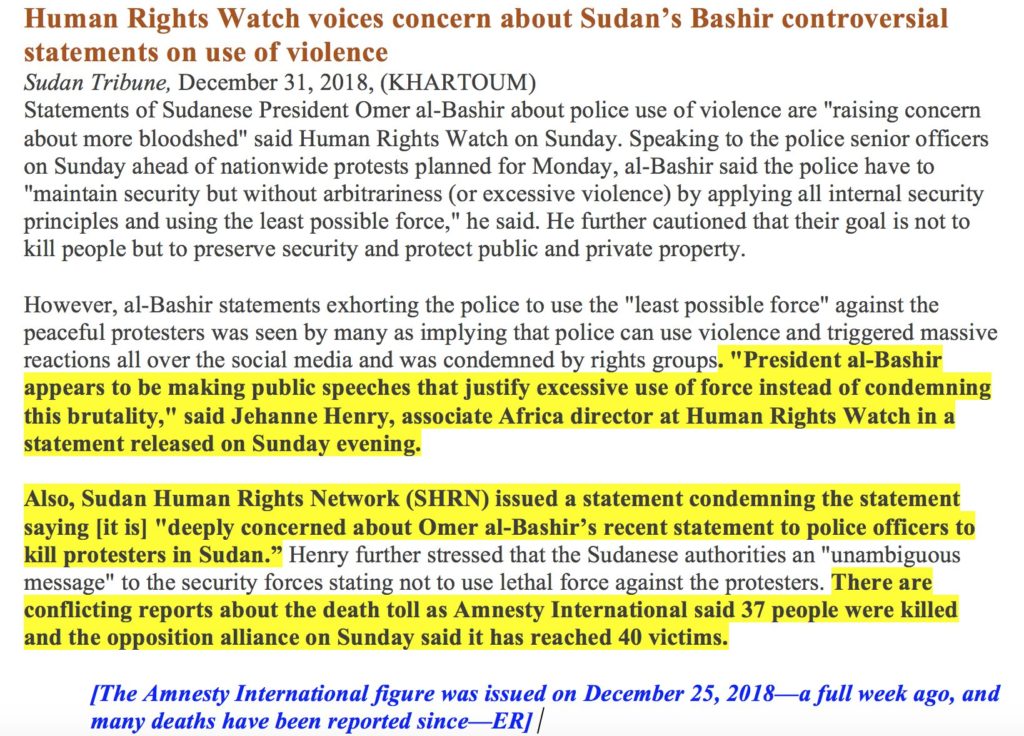
• It is difficult to imagine more disingenuous and expedient responses to the violence in Khartoum and elsewhere in Sudan than Western calls for this criminal regime to “investigate” its own war crimes. There must be immediate, dramatic, painful consequences for the al-Bashir regime:
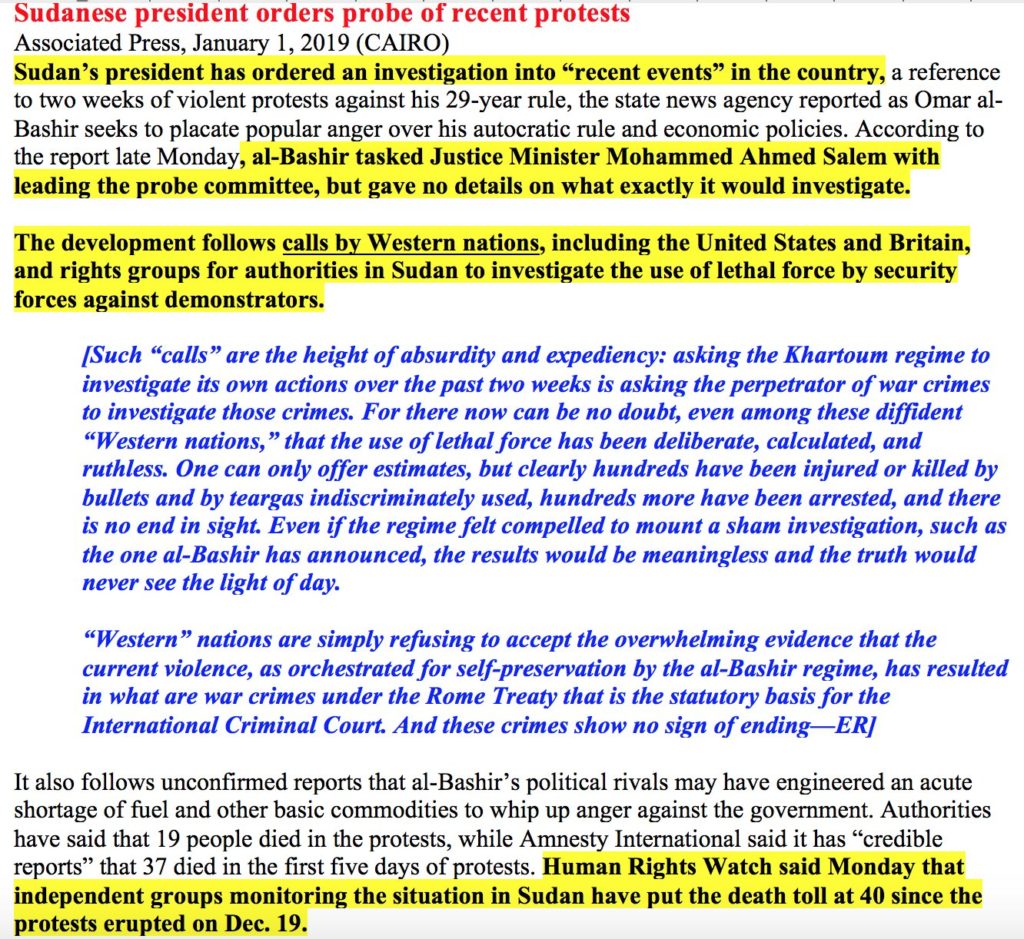
• When will the international community respond with appropriately vigorous condemnation of the regime’s military suppression of peaceful protests? The use of snipers to kill young men? The indiscriminate, dangerous use of teargas? The issuing of “shoot to kill” orders?
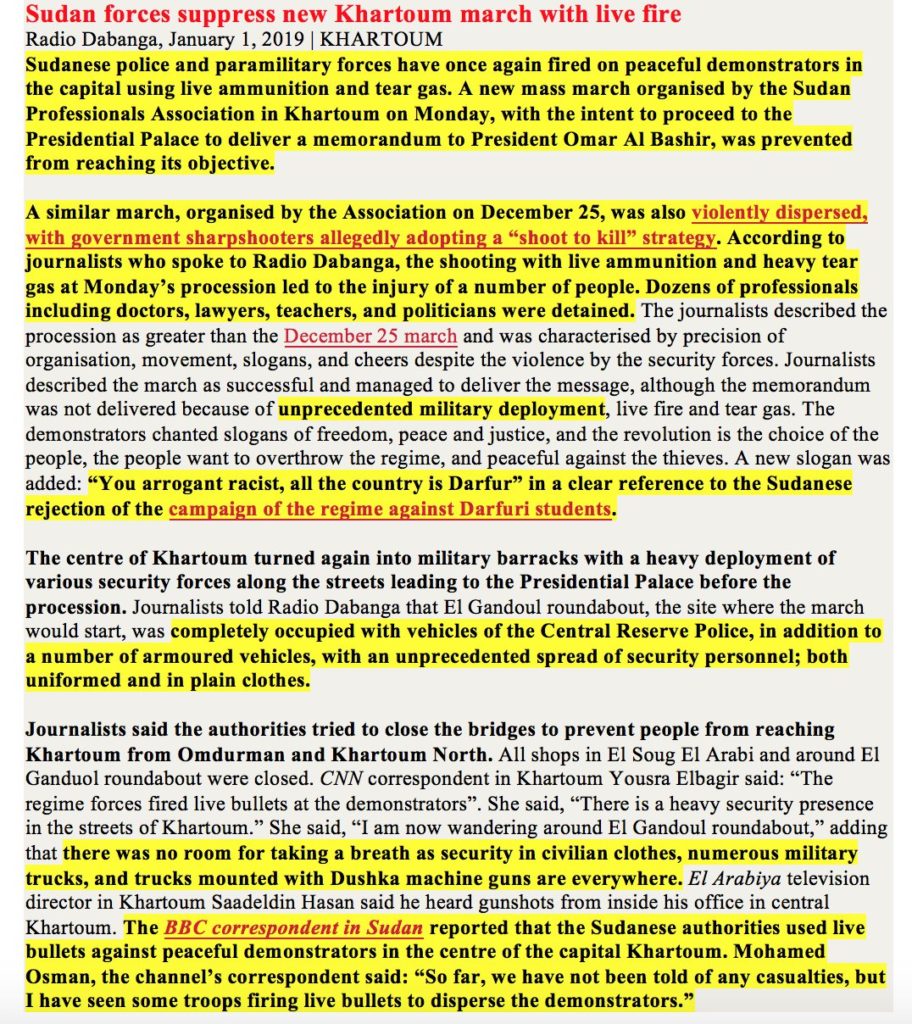
December 31, 2018
• Ominous threat of Russian involvement in security operations in Khartoum:
• A particularly useful and well-informed account of the history of al-Bashir’s tyrannical rule of Sudan; some points here might be qualified, but both women are on the ground in Khartoum and their views are invaluable http://cnn.it/2s0RwwY
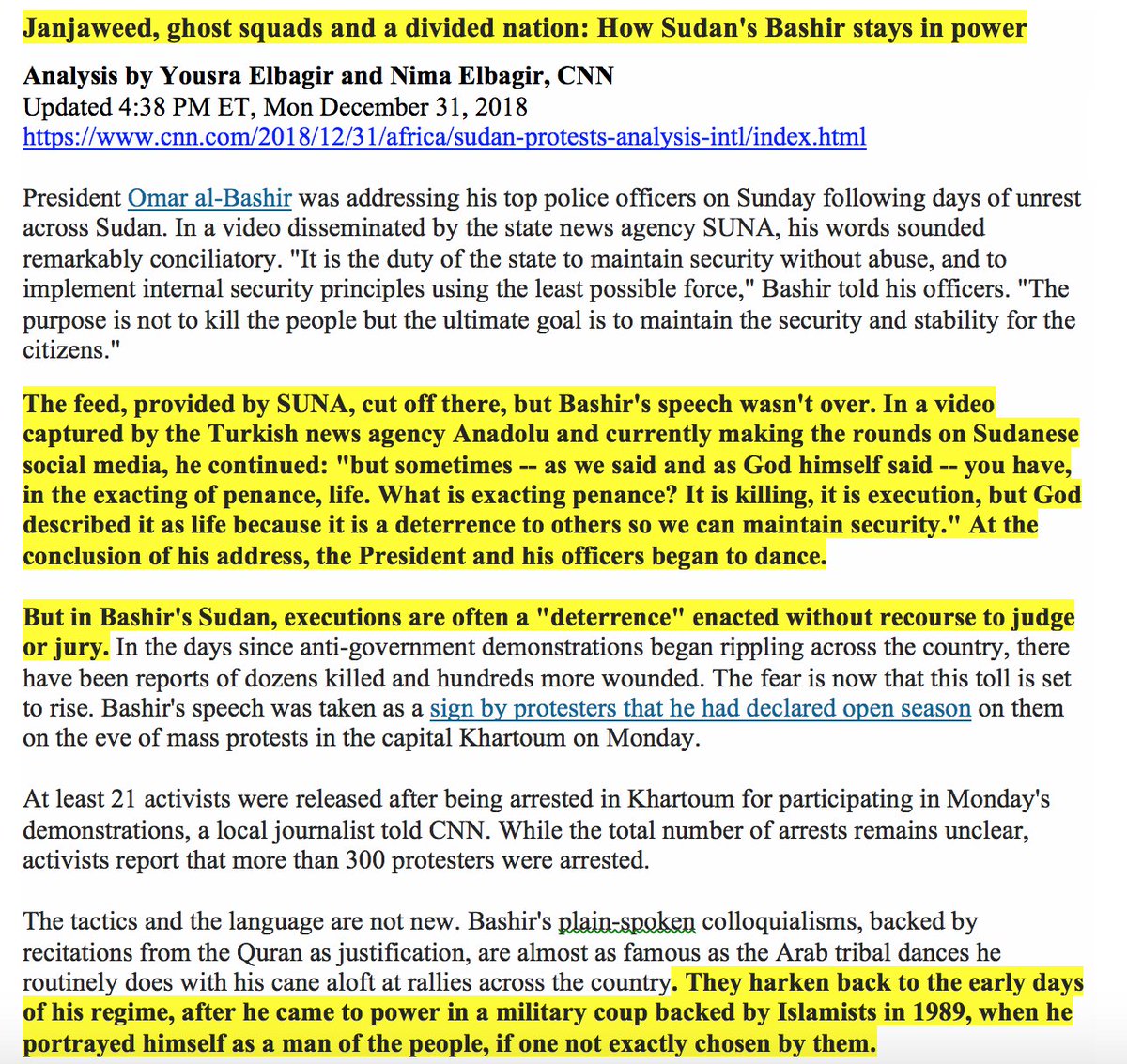
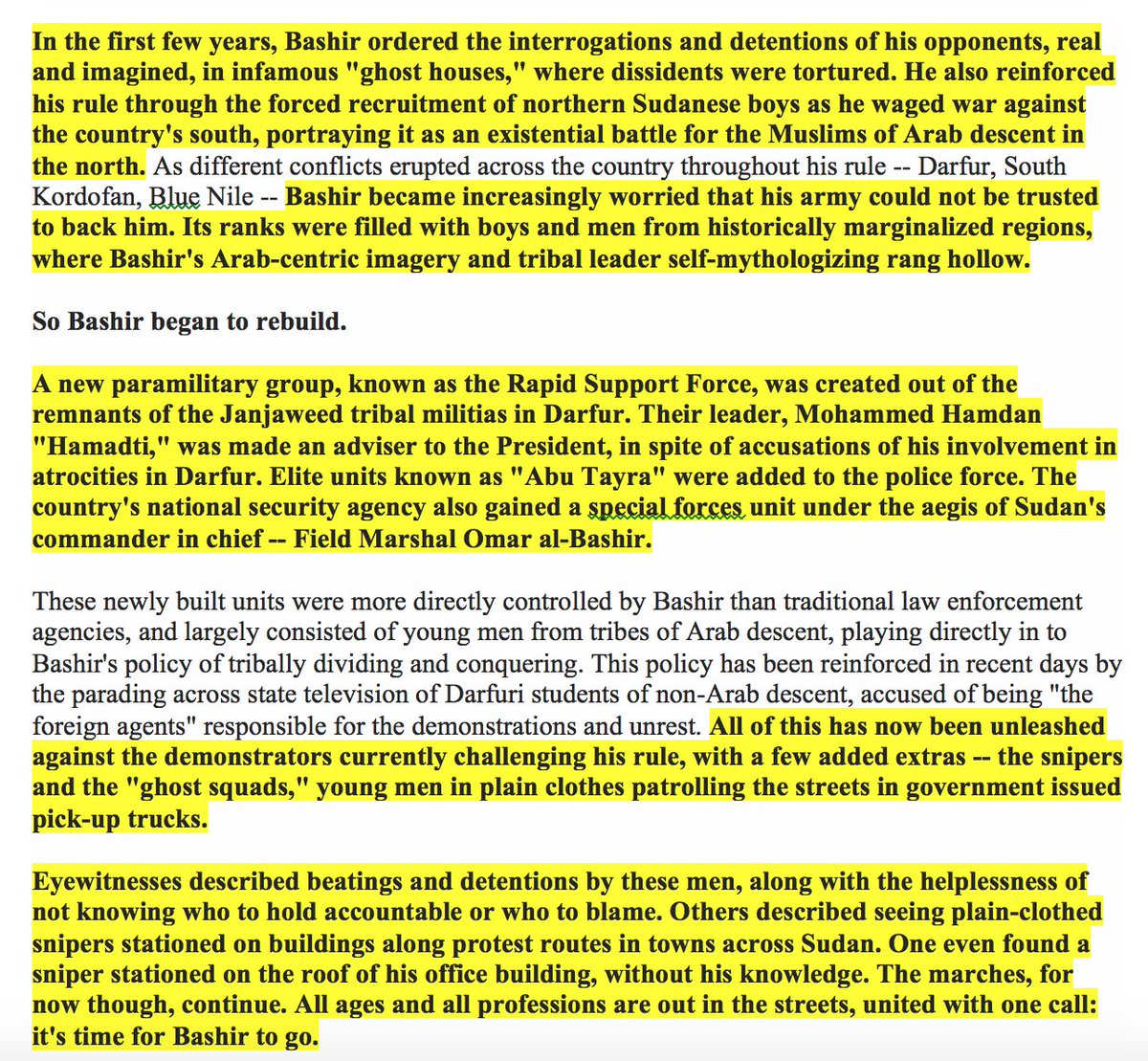
• BBC World Service, “NewsHour” (December 31, 2018, 21:00 GMT): broadcast is live at this moment but can be streamed shortly | http://bbc.in/2Qbf6kt A particularly important broadcast segment:
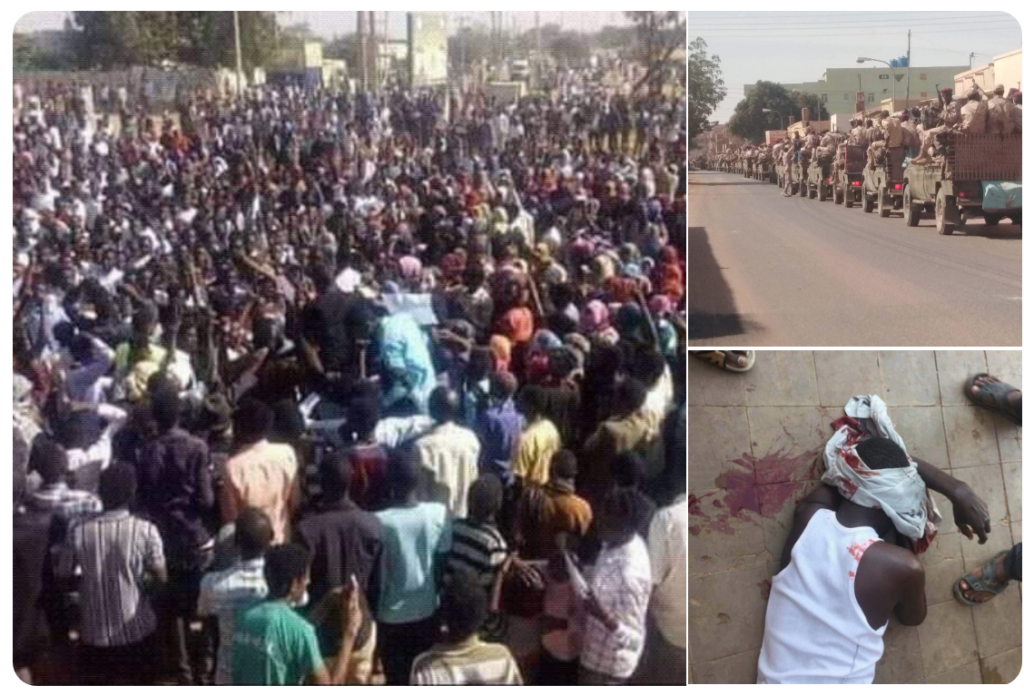
• Updated/corrected–extremely important and revealing graphic #Sudan #SudanRevolts #SudanUprising #SudanProtests
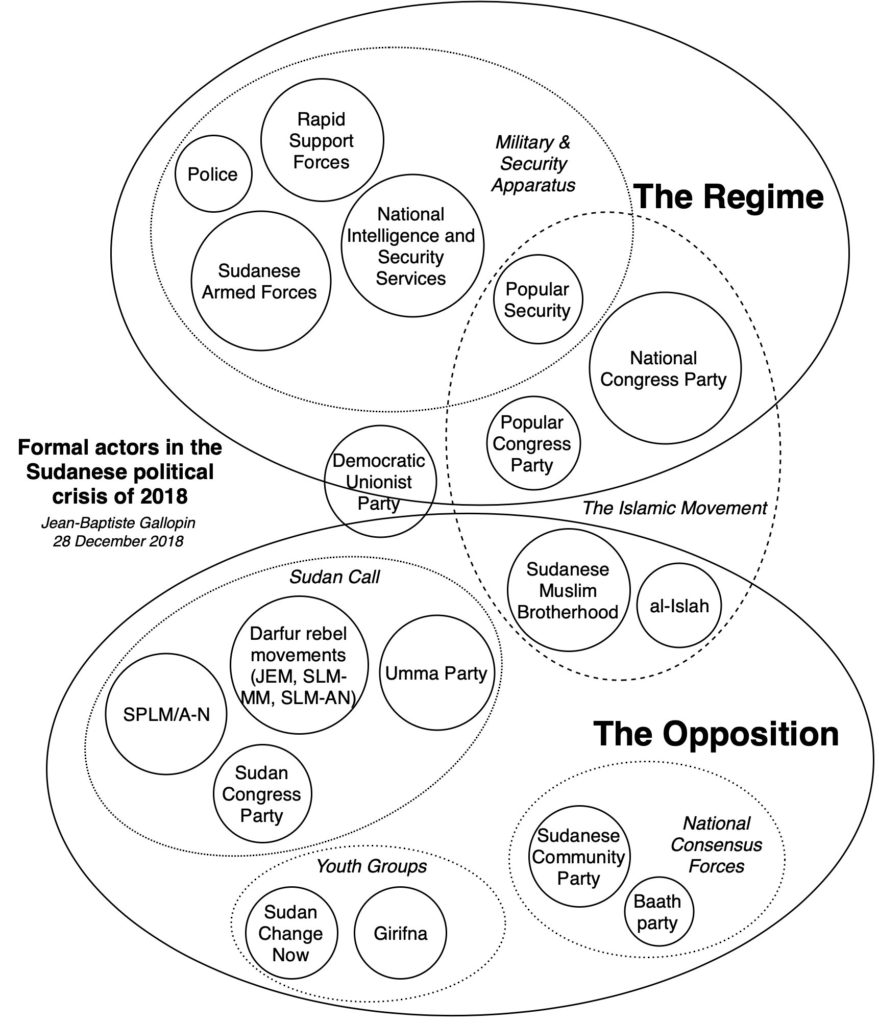
• This is indeed a critical part of regime’s security apparatus:
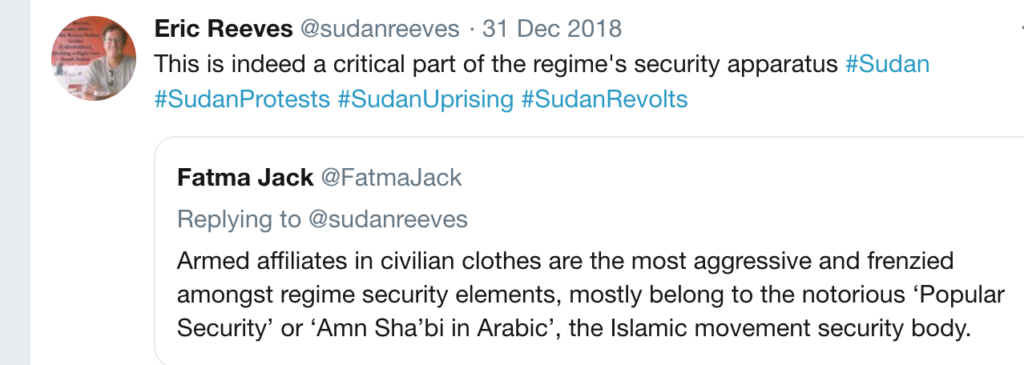
• Additional news/information from Agence France-Presse today (December 31). Two more deaths (at least) from bullet wounds to the head; doctor shot in thigh; others wounded by blows to the head from teargas canisters
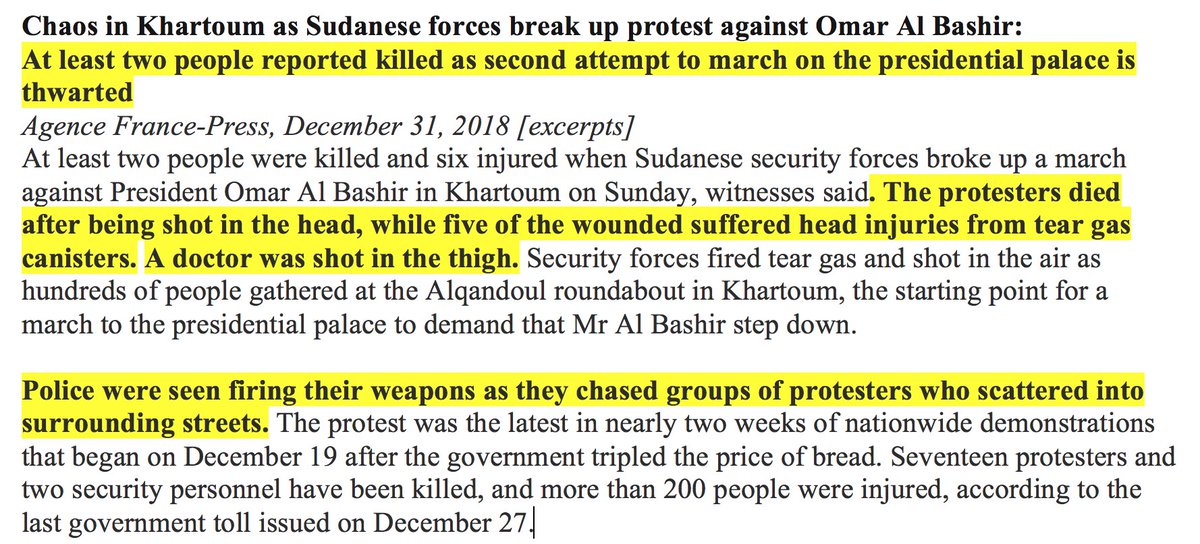
• CNN is finally beginning to move to the fore in reporting on Sudan with Sudanese journalists on the ground: https://edition.cnn.com/2018/12/31/africa/sudan-protests-analysis-intl/index.html?no-st=1546361454
• Journalist Yousra Elbagir @YousraElbagir givea a brilliant short synopsis of today’s events and her own experience at hands of security to BBC http://bbc.in/2R0zrhx She emphasizes how alarmed the regime is at mobile phone video and photography, what they show of current realities: https://www.bbc.co.uk/sounds/play/w172w61522qglnf
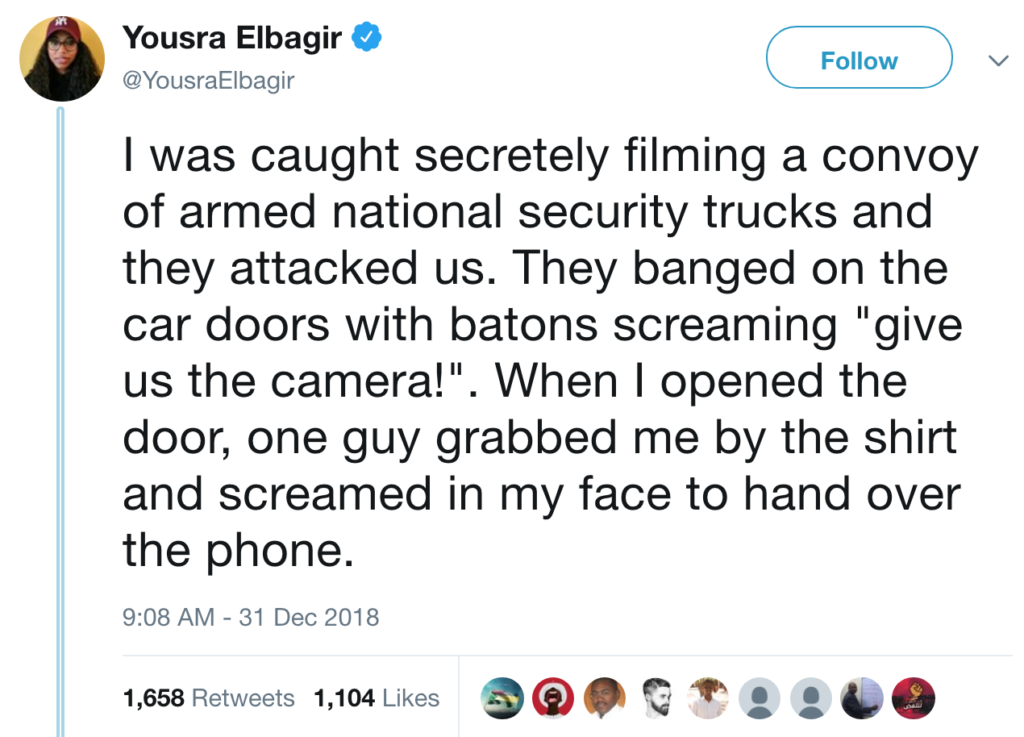
• It is vitally important that international news coverage be as complete as possible, especially in reporting on what actions the al-Bashir regime has taken. These clearly include the use of live ammunition unambiguously directed at protestors, disproportionately to the heads of young men:
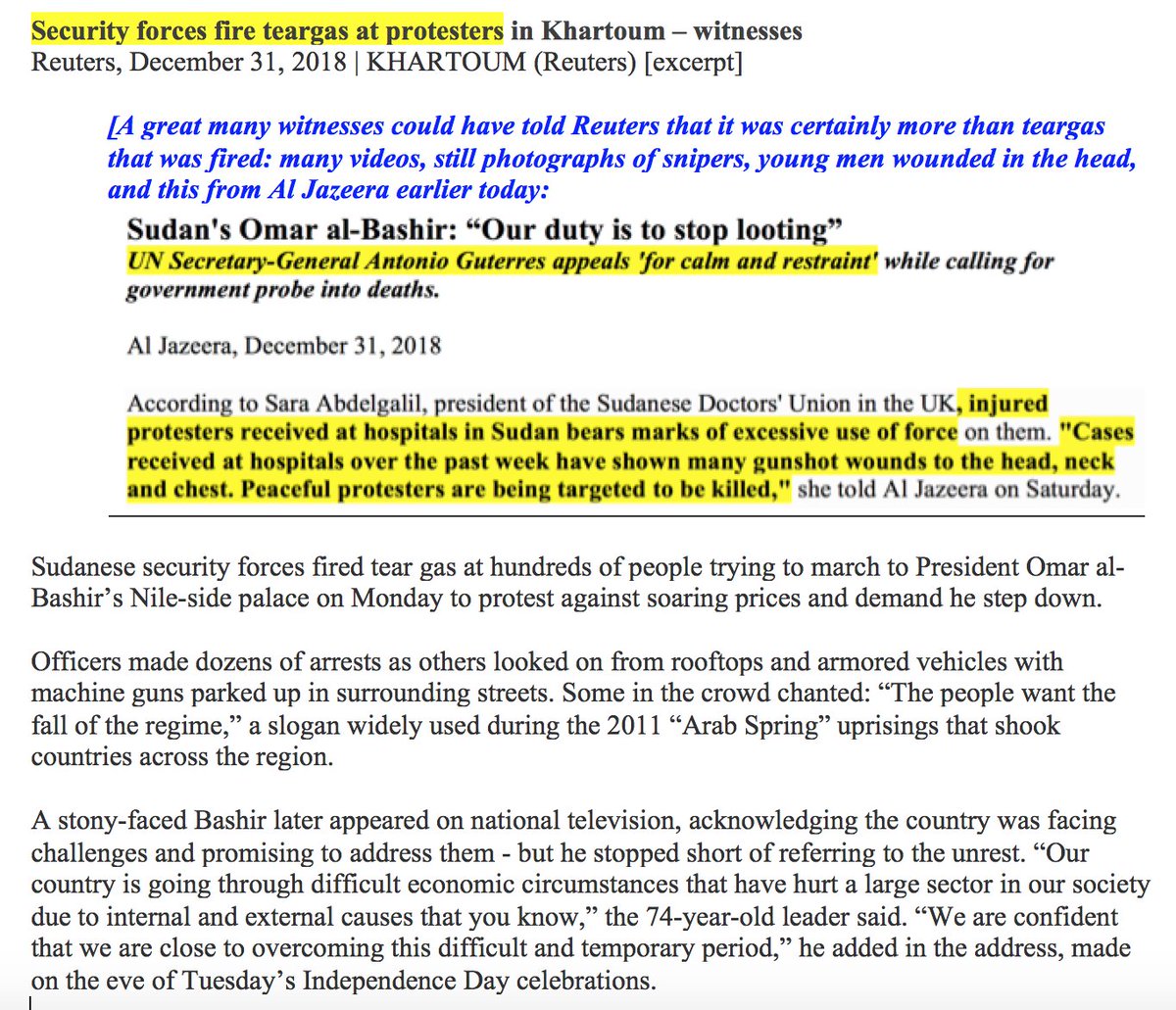
• The people of Sudan could not be speaking more clearly, and yet the international community refuses to listen with either comprehension or compassion. Urging “restraint” on peaceful demonstrators as they face “shoot to kill” orders is obscene expediency by UN and African Union leadership:
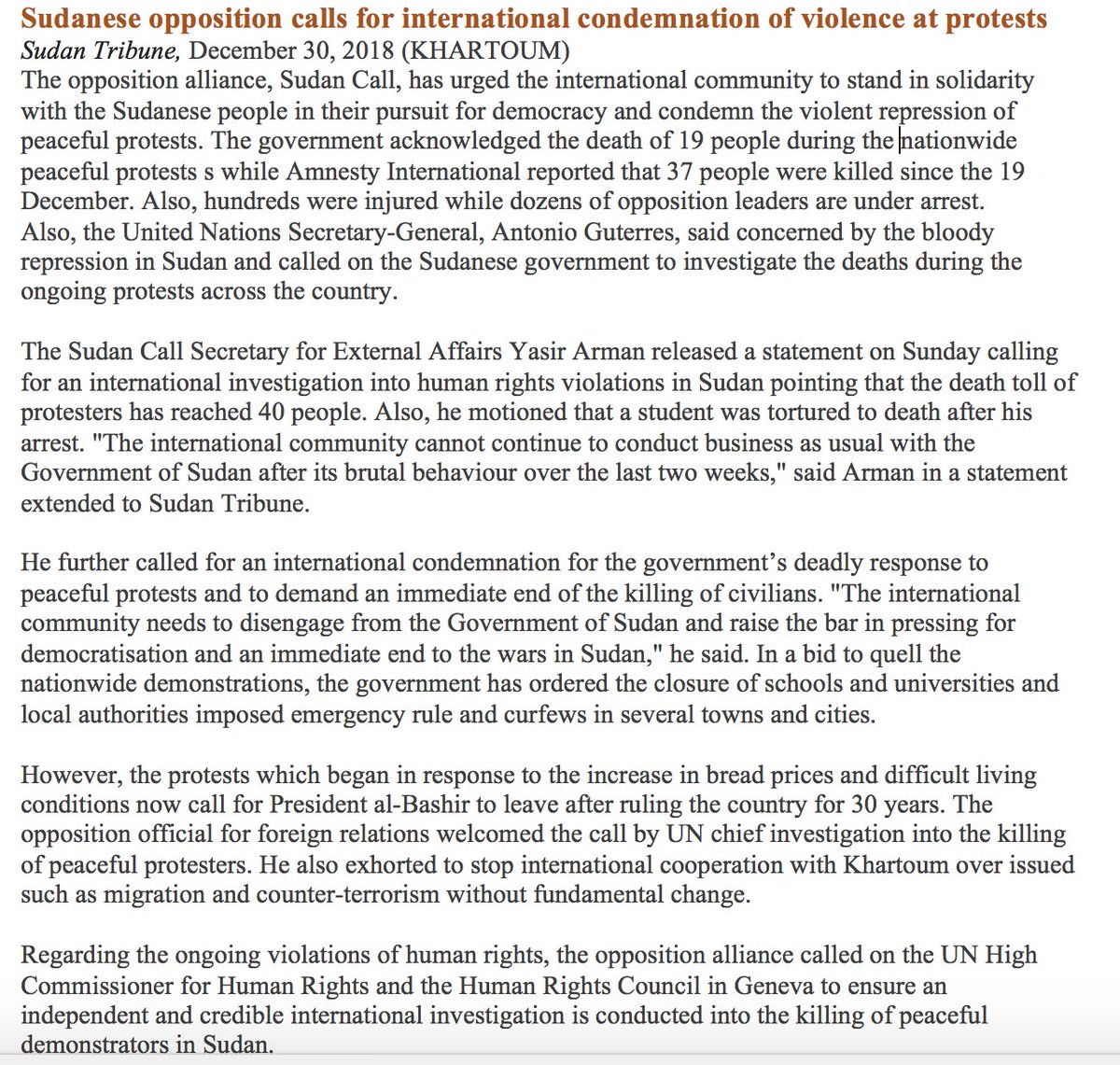
• Here is more clear evidence that “shoot to kill” orders have been issued, already strongly suggested by the number of snipers in strategic positions and young men with gunshot wounds to the head. “Restraint,” UN Secretary General Guterres? This is despicable “moral equivalence”!
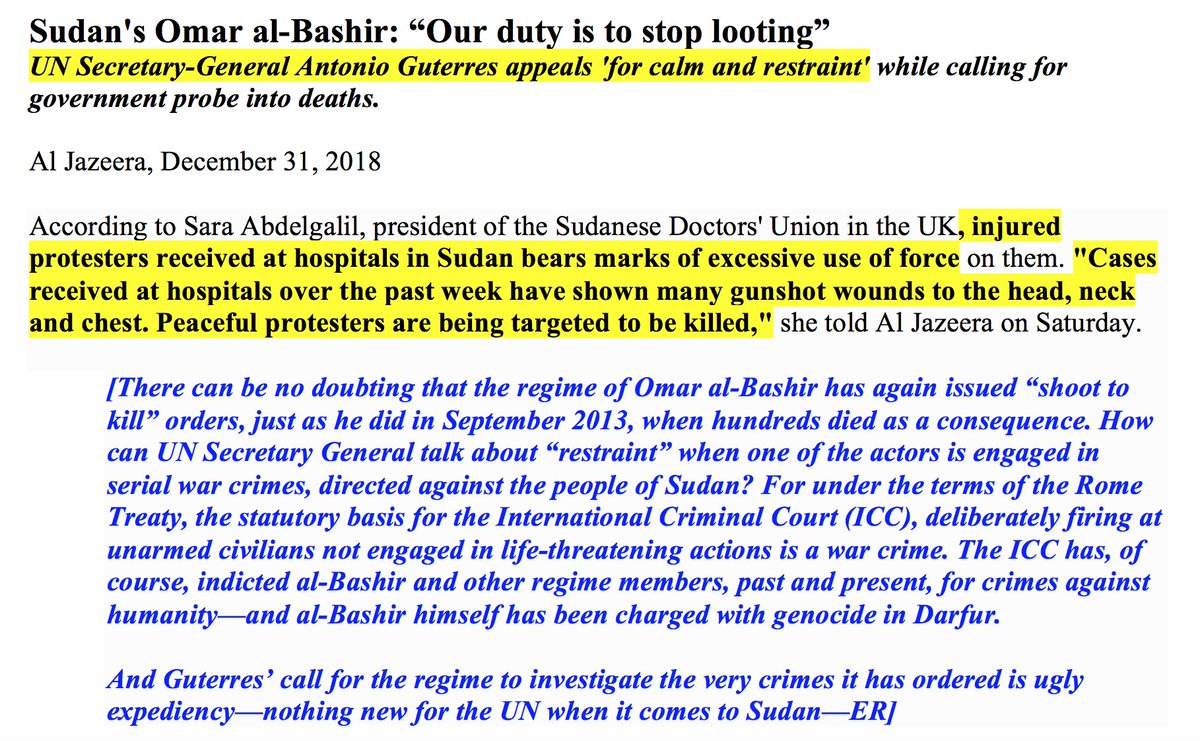
• Video shows people fleeing as gunshots are heard in the background. Becoming increasingly clear that extreme violence is the primary tool of the al-Bashir regime in repressing today’s protests. “Moral equivalence” declared by UN and African Union is appalling expediency
• By urging “restraint” on all parties in Sudan–the regime and peaceful protestors–the chairperson of the AU is implicitly supporting the al-Bashir regime. He’s indulging in “moral equivalence” between the oppressors & the oppressed, telling the latter to be quiet! Disgraceful!
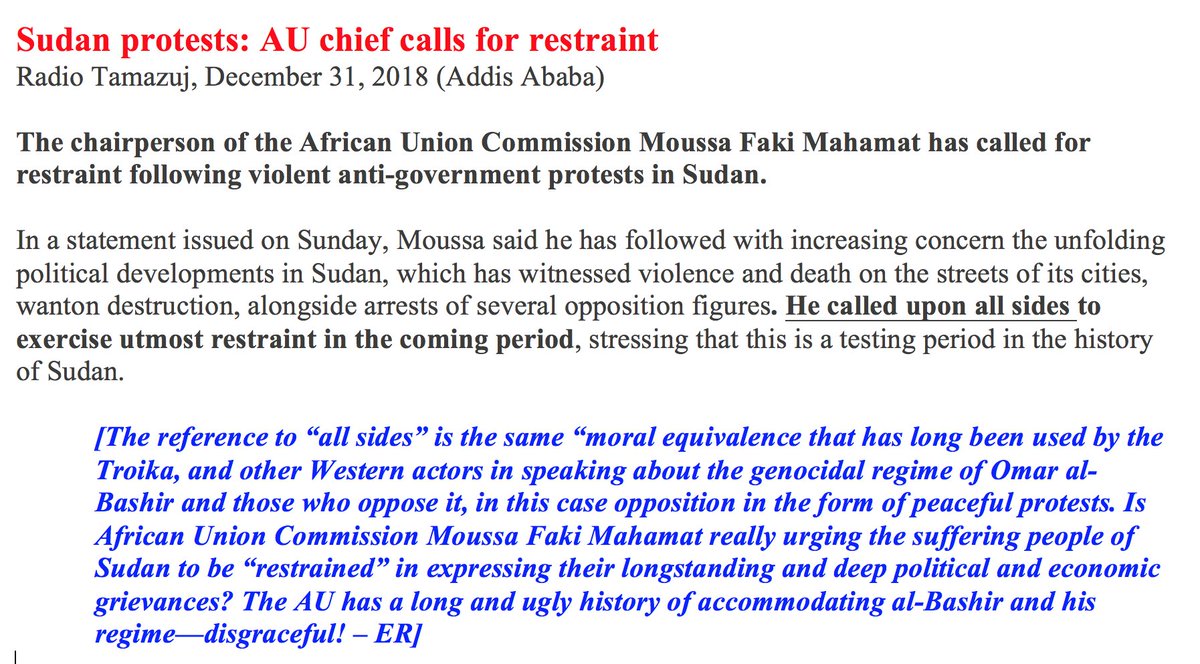
• This is precisely what al-Bashir was urging to the police forces in his speech of yesterday, as he tortured the Quran to justify his bloody tactics. Where are the international voices of condemnation from Europe, North America, the UN, the AU?
• Here is first international reporting on today’s demonstrations in Sudan police have been as brutal as al-Bashir urged them to be. Many wounded, some killed; many fleeing the heavy, excessive use of tear gas. The ruthless thinking of the al-Bashir regime is unchanged.
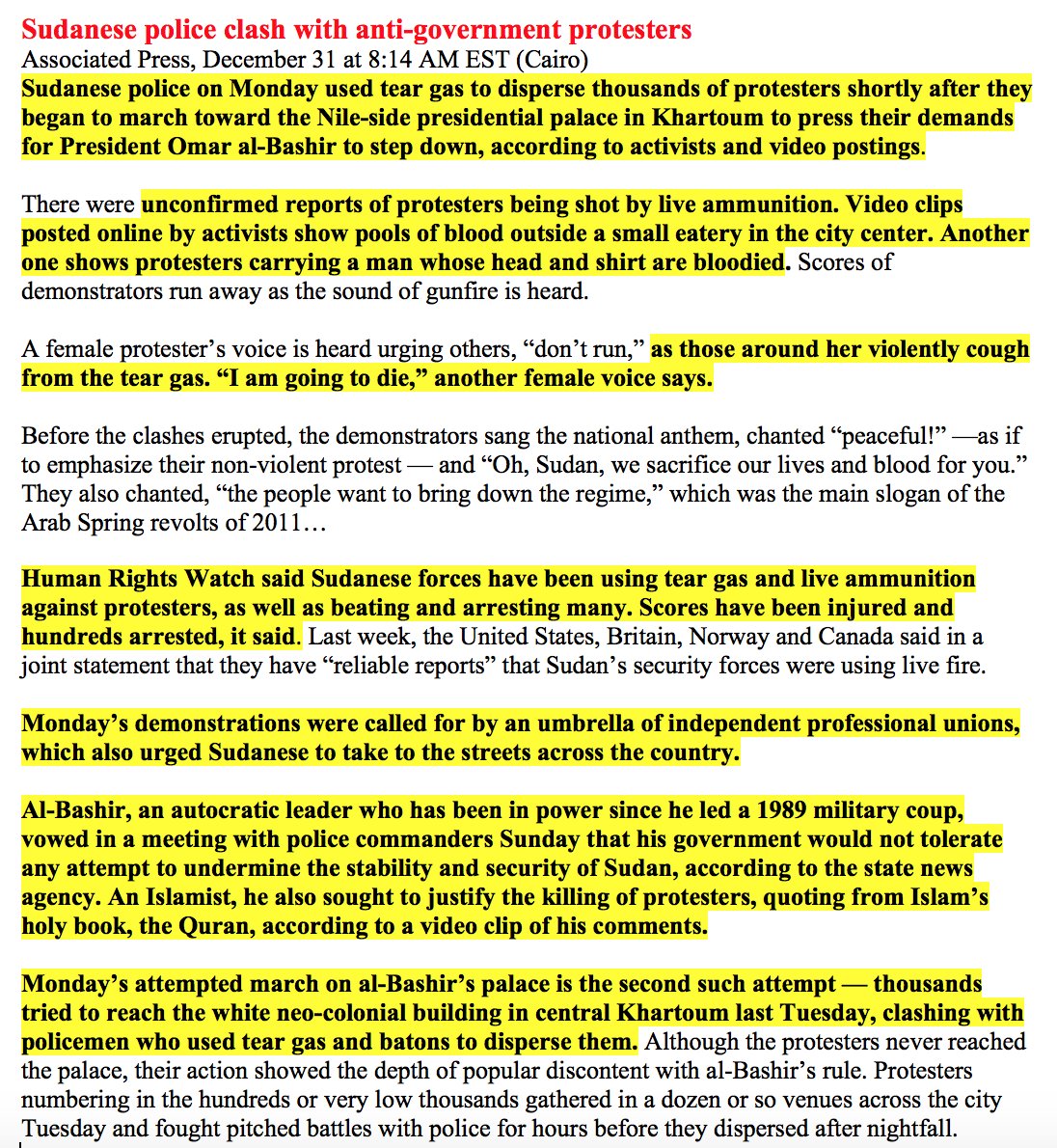
• Peaceful protestors in Sudan hit with alleged tear gas. Footage geolocated to Al Hurriya Ave in Khartoum’s market area (https://goo.gl/maps/vUbFtdoS2rz …) shows protestors sitting and chanting and struck with alleged tear gas
geolocation: https://www.google.com/maps/place/15%C2%B035’52.7%22N+32%C2%B031’16.2%22E/@15.597961,32.5206145,220m/data=!3m2!1e3!4b1!4m6!3m5!1s0x0:0x0!7e2!8m2!3d15.5979605!4d32.5211628?shorturl=1 o
• Ashraf El-Ga’aly @dardachat 31 Dec 2018 Wad Medani, 85 miles SE of Khartoum, joins the train of today’s events:
December 30, 2018
In a speech today to leadership of #Sudan‘s police [ http://bit.ly/2EVUNp3 ] Omar al-Bashir tortured the Quran into justifying “shoot to kill” policies, and his orders to implement such policies. Below a short explanation of this criminal incitement by a knowledgeable Sudanese:
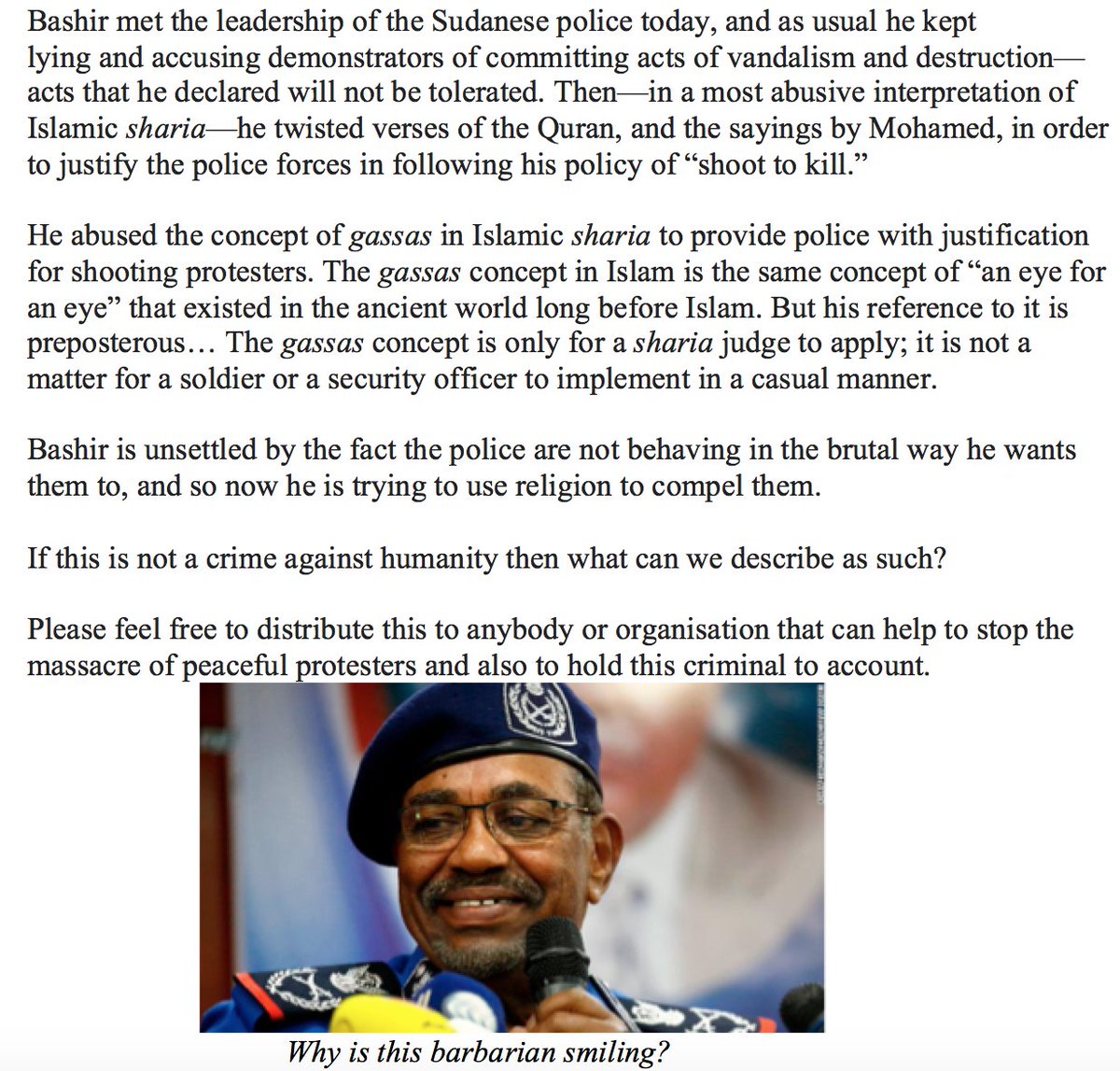
• Coming as it does on the eve of the anniversary of Sudan’s independence, this march to the residence of the president promises to be an extraordinary, perhaps defining moment in the country’s history:
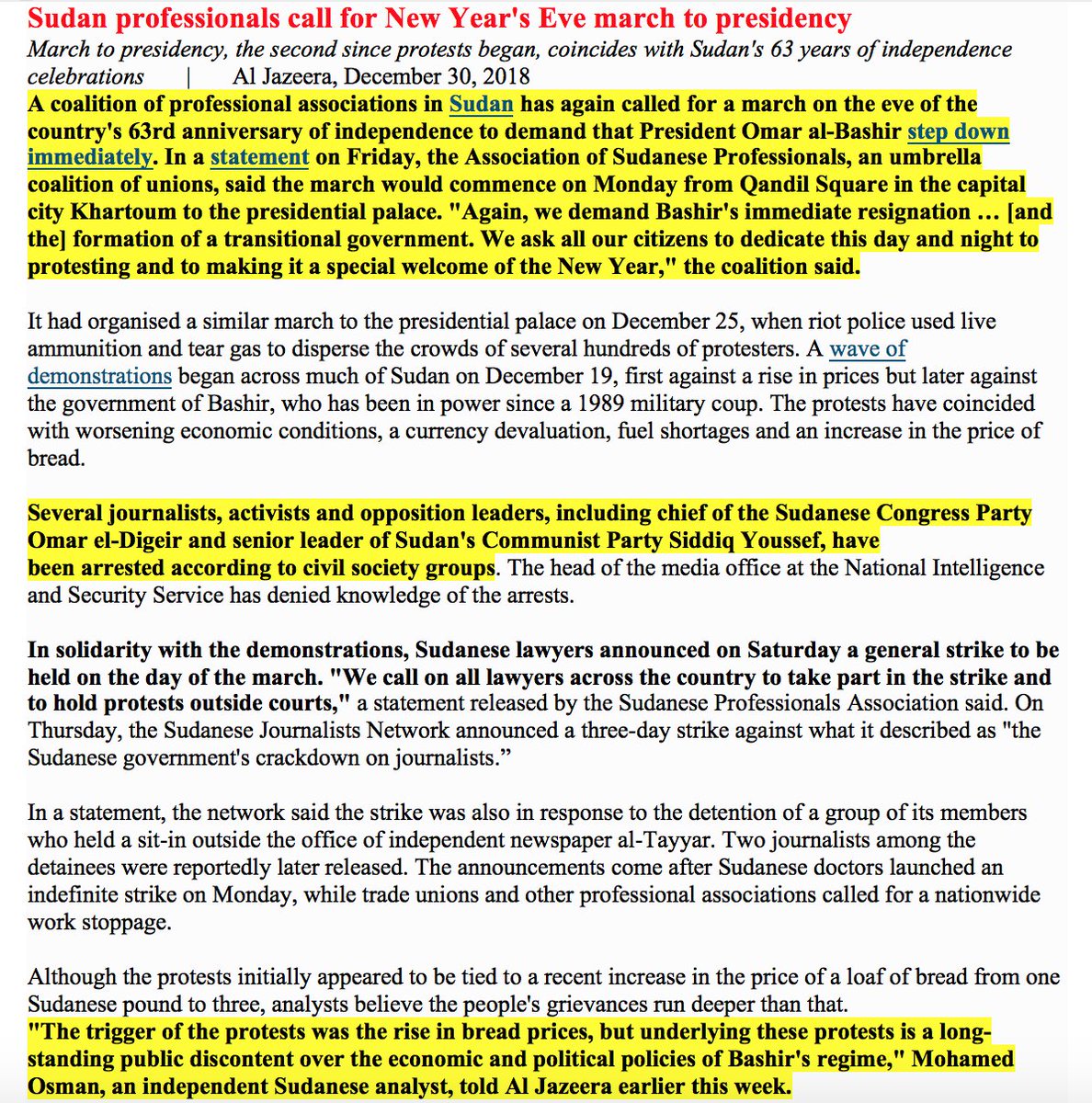
• All this means is al-Bashir is seeking to keep the police on-side with the regime: pay the police…but forget about medical personnel, sanitation workers, teachers, and many others–the real victims of the collapse of Sudan’s economy for which the al-Bashir regime is responsible:

• As described, the analysis below suggests that South Sudan would be better off if al-Bashir’s regime stays in power. Given brutal history of Khartoum’s aggression toward South, including after 2005 CPA, this is absurdly short-sighted and ignores far too much. Commentary below:
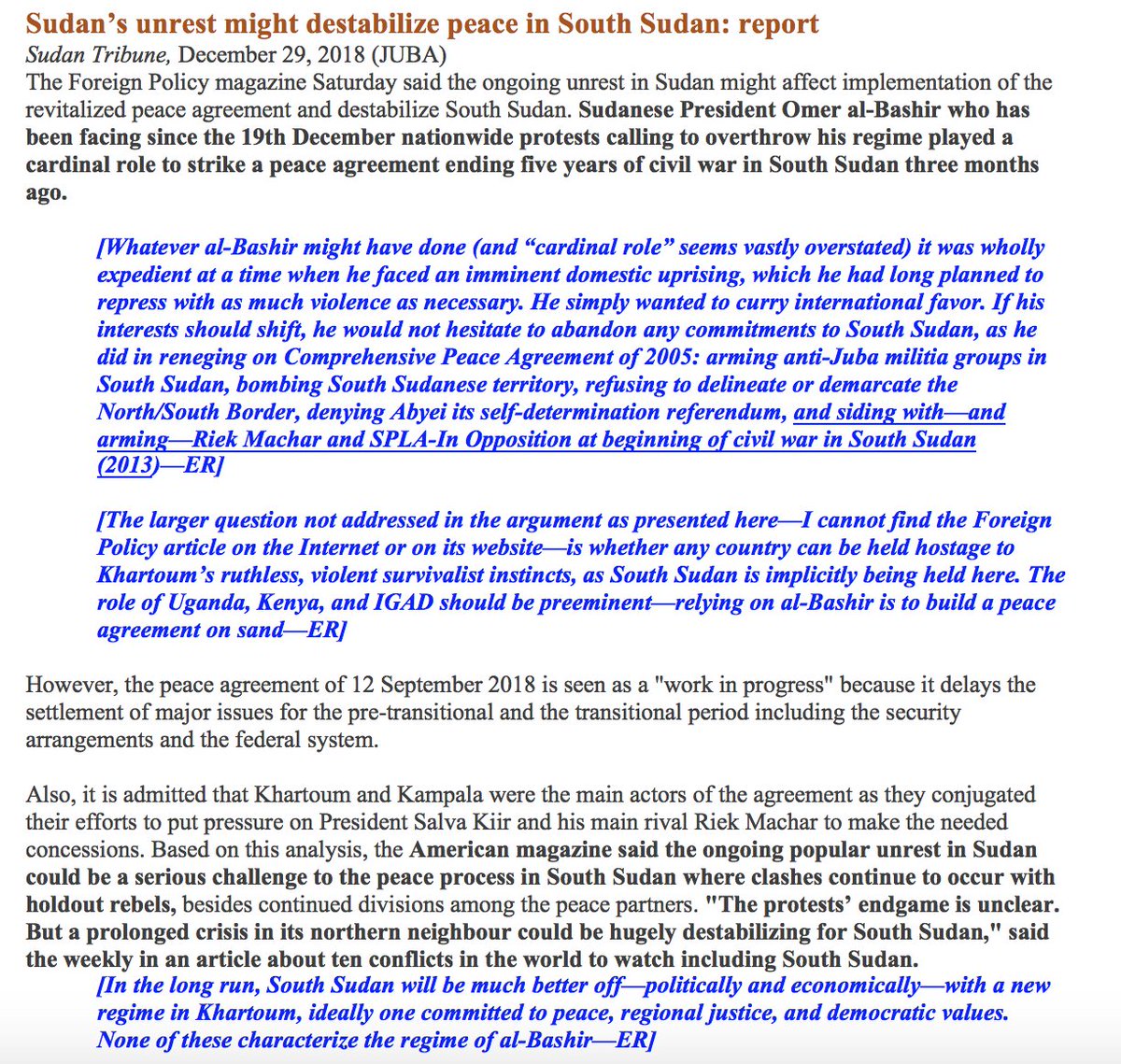
• It is clear that NISS is monitoring social media and making full use of informants as plans for new demonstrations are made. We should expect to see more dispatches such as this from Radio Dabanga. But the determination of the people of #Sudan is clear.
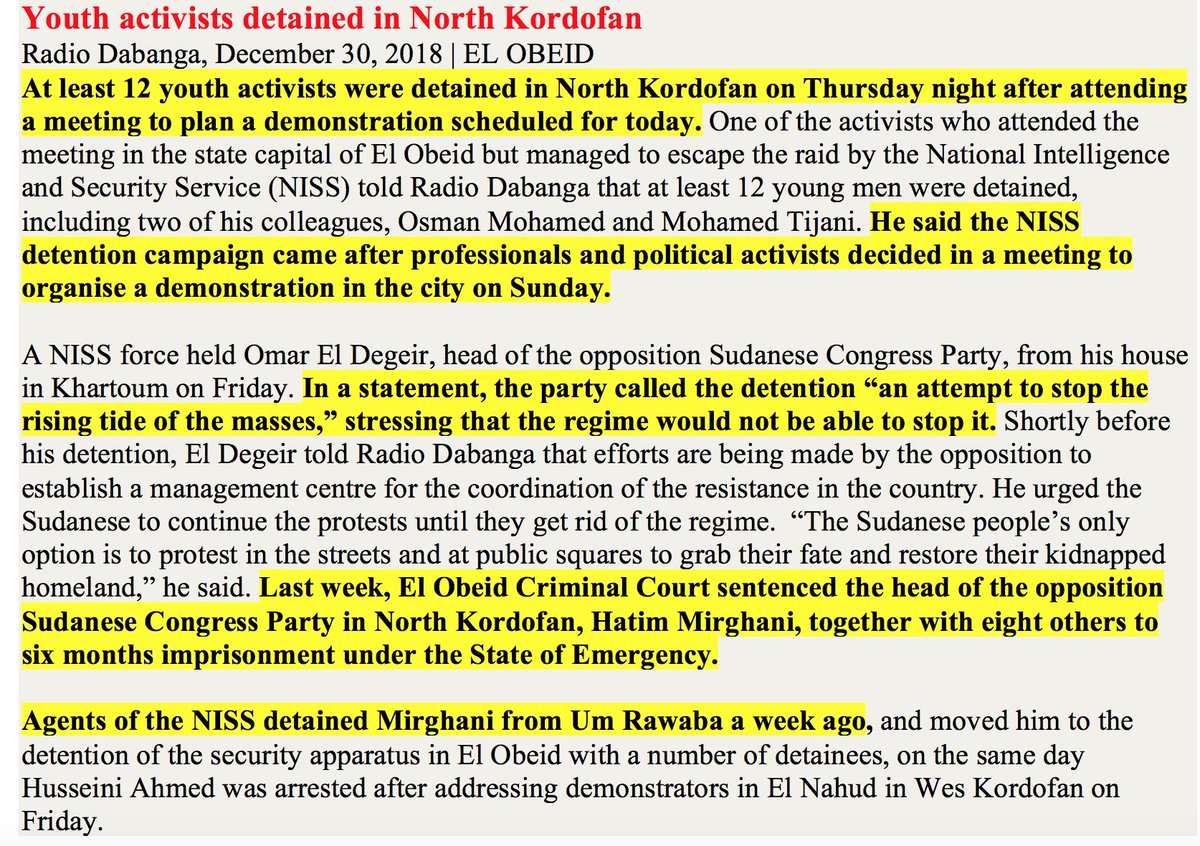
• Useful update/overview from The Guardian (UK); highlights figure of sixty (60) reported dead at hands of security forces; points to use of “virtual private networks” (VPN) in providing news/photos in partial circumventing of regime’s electronic censorship:
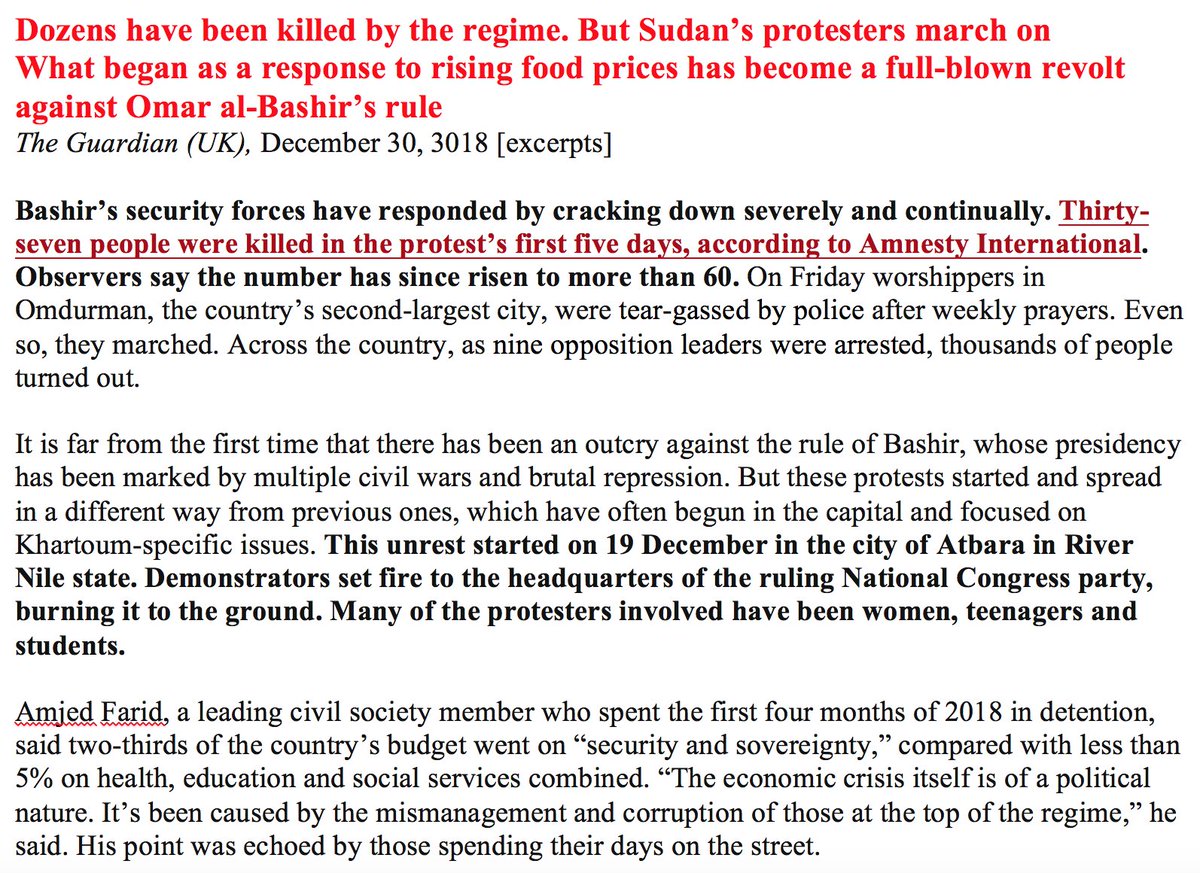
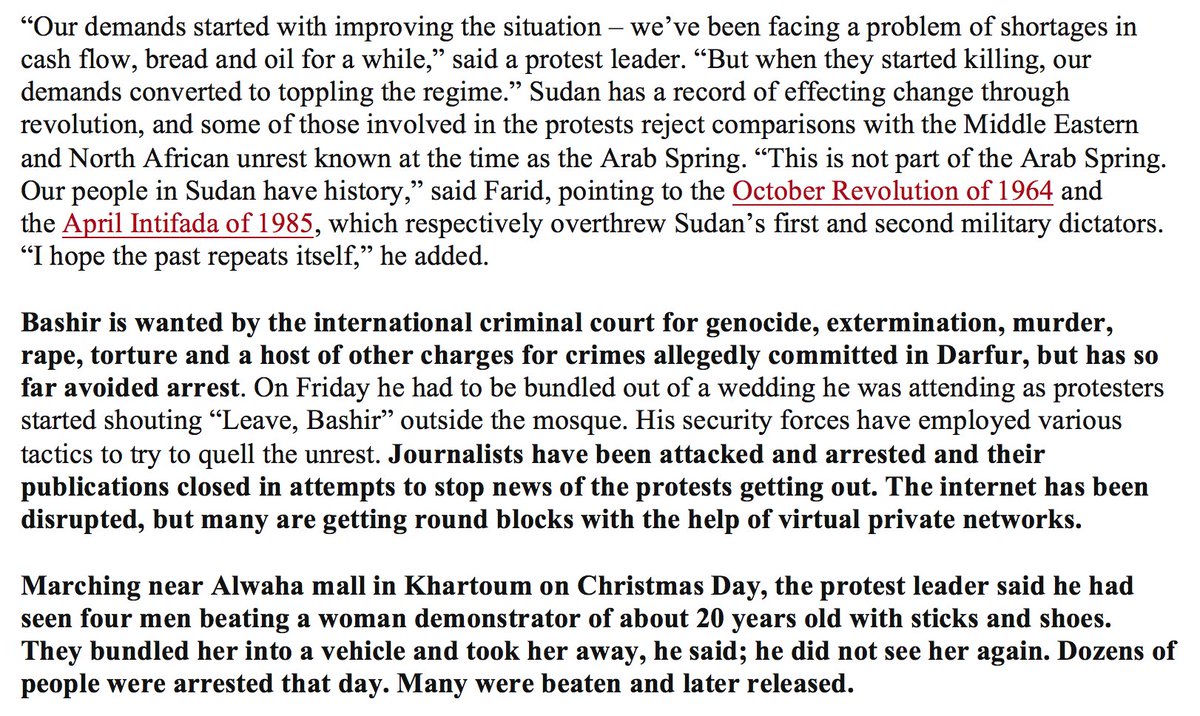
• More arrests of journalists, as regime seeks to keep people from knowing the truth about current developments. The regime also fully controls all broadcast “news” services, and can deploy television and radio for propaganda purposes:
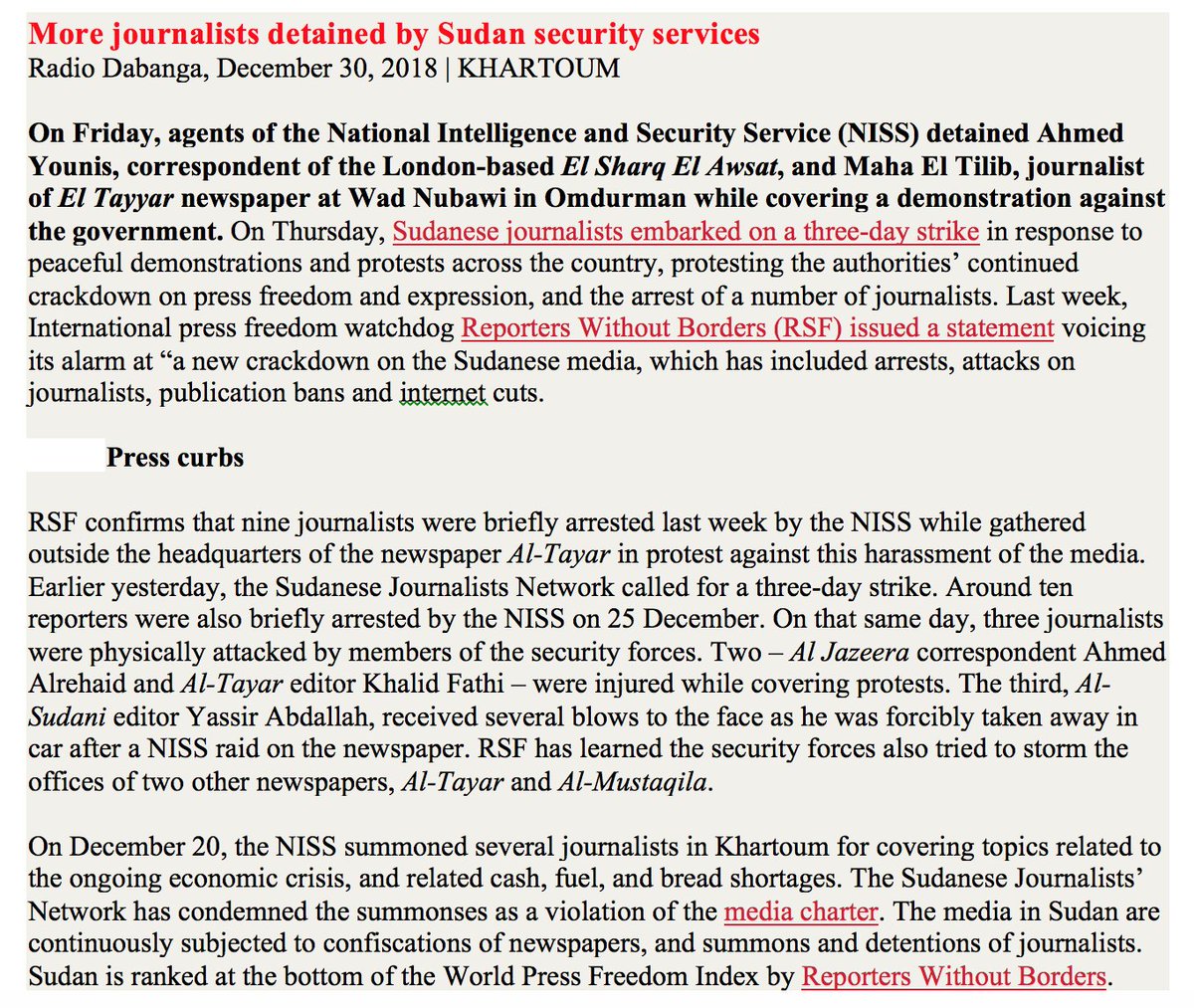
• Arrests and violent repression are the only tools left to the Khartoum regime. The best international reporting on this is that of Al Jazeera, with a journalist on the ground in Khartoum. Social media blockages by the regime have increased.
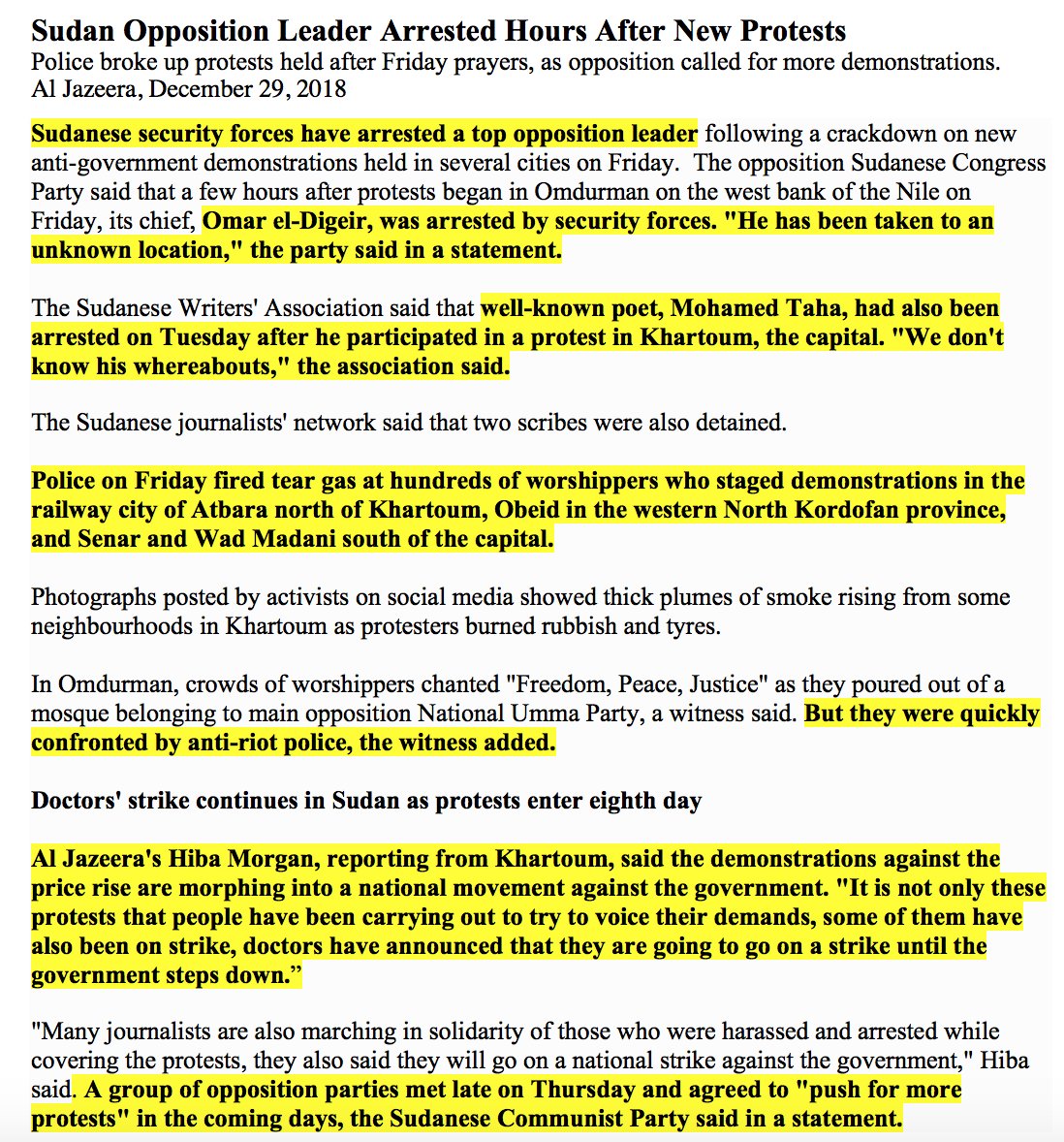
• Darfuris, predictably, being made scapegoats amidst present demonstrations and civil unrest. Charges by regime against Sennar Univ. students are preposterous on their face, incl. charge that Israel’s Mossad trained them. Tortured into forced confessions, then displayed on TV:
